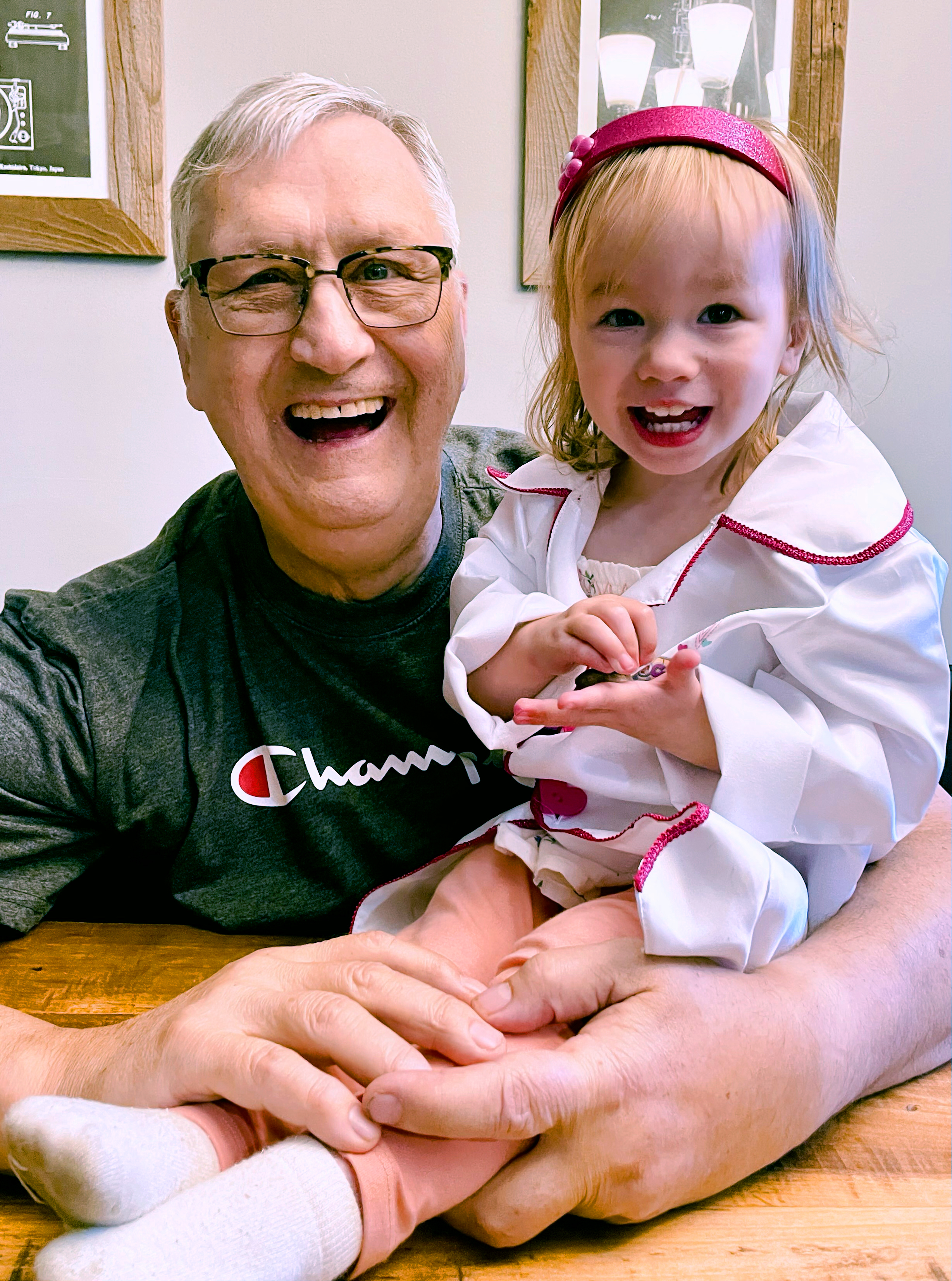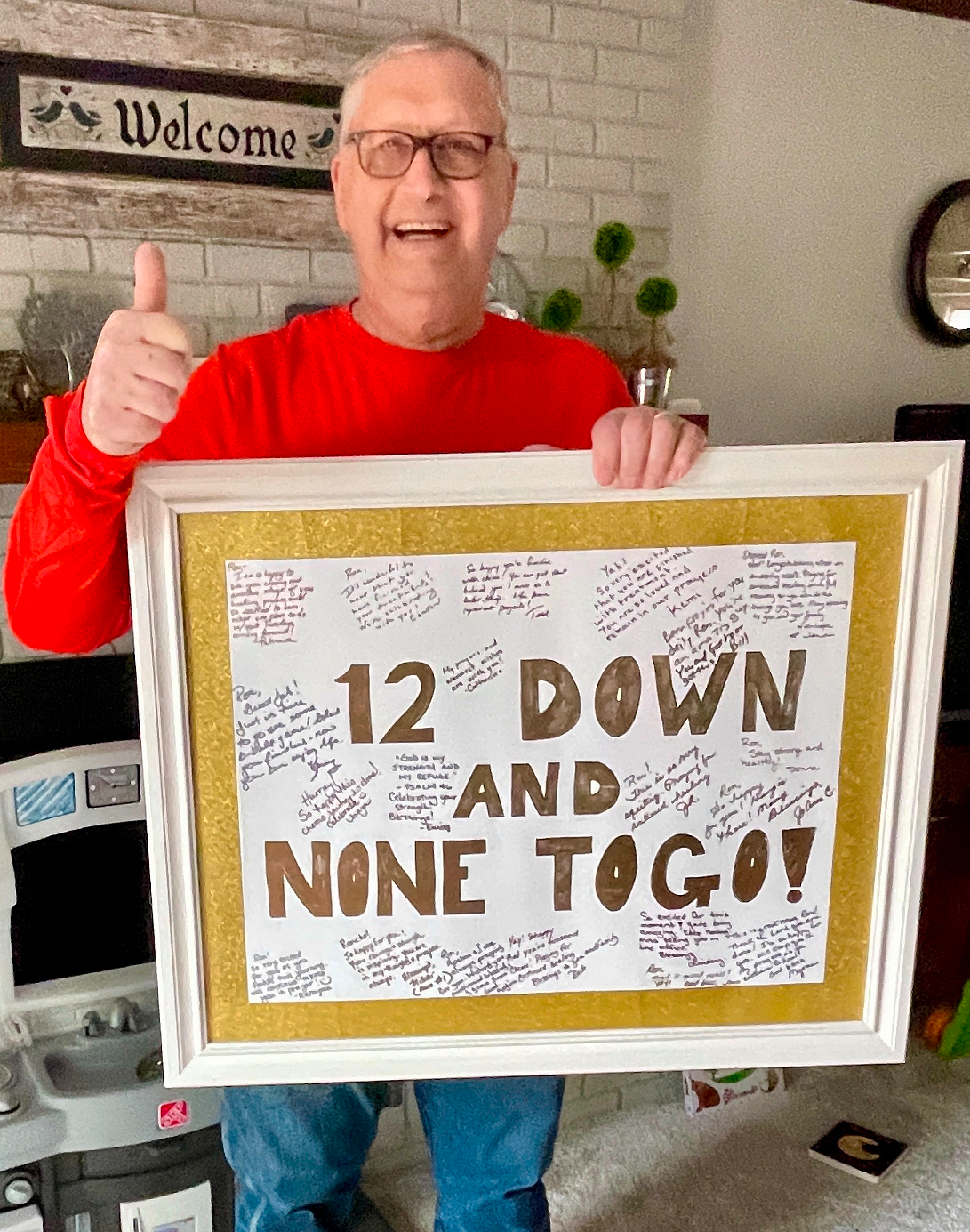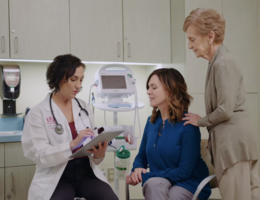
Ronald Blaum's granddaughter examines her grandfather and declares no signs of cancer. He started his pancreatic cancer care journey at Loma Linda University Cancer Center and completed his treatment in July 2022.
Ronald Blaum’s granddaughter was not yet a year old when he was diagnosed with pancreatic cancer in June 2021. Today, three-year-old Annelyn can don her white coat, use her medical toolkit to examine her grandpa, and announce, "no cancer.”
“Here I am,” Blaum says. “You would see me on the street today and would have no clue of what I've been through.”
Blaum, 70, is grateful that he and care teams at Loma Linda University Health caught his pancreatic cancer when it was still resectable — meaning it was able to be surgically removed in a highly complex surgery called a Whipple procedure (pancreaticoduodenectomy) that can offer the potential for cure.
Read: How to best protect yourself from two hard-to-spot cancers
“Surgery gives the best chance of long-term survival for patients with pancreatic cancer,” says Jukes Namm, MD, a surgical oncologist at Loma Linda University Cancer Center who performed Blaum’s Whipple procedure.
When Blaum’s wife, Cheryl, learned that her husband would require a Whipple procedure, she recalled her nursing career in the 1980s and 90s; she’d witnessed patients struggle after their Whipples, undergo repeat re-admissions, and rarely thrive afterward.
Blaum’s care team brought his case to the tumor board, a multidisciplinary group of cancer experts who dedicate time to discuss individualized patient treatment plans to optimize their outcomes. After consulting with his care team, Blaum says he felt determined to move forward with the Whipple as the initial step in his treatment.

Ronald Blaum and his three-year-old granddaughter, Annelyn.
“I'm the kind of person who doesn't dwell on things,” Blaum says. “It's like, ‘okay, this is what I'm dealing with. What are the next steps? What do we need to do?’”
Although the Whipple is a procedure that’s been around for nearly a century, Namm says a lot has changed to improve patients’ experiences and recovery. Beyond better technology, Namm says providing whole-person care before, during, and after surgery proves integral to patients' healing.
The Whipple is a major, invasive procedure, Namm says, so it’s essential to prepare patients in the most optimal way possible. Care teams nowadays use a protocol called Enhanced Recovery After Surgery (ERAS), dedicated to monitoring and controlling the risk factors that could potentially increase the risk of surgical complications (e.g., nutrition, body temperature, blood sugars, pain control). Namm says ERAS has been found to benefit patient safety and recovery through interventions such as decreasing the risk of infections to optimizing intraoperative fluid management. Before and after his Whipple, Blaum worked with experts in pain management, nutrition, and physical therapy.
“Surgery alone cannot achieve the best outcome for patients with pancreatic cancer,” Namm says. “It takes a whole care team to bring together various modalities and disciplines, which is crucial for all cancer care, but specifically in treating pancreatic cancer because the stakes are so high and the surgery involves high risk.”
During Blaum’s 10-hour surgery in July 2021, Namm removed a portion of the pancreas, the first part of the small intestine (duodenum), and a portion of the bile duct. His gall bladder had been previously been removed. The stomach, which is often modified, didn’t require significant removal.

Blaum's former coworkers at Loma Linda University Health sent him a signed poster to celebrate his completion of chemotherapy in Indiana.
Blaum was eating and walking within days of the procedure and returned to his temporary stay in Loma Linda a week after the surgery, he says. During this time, he says loved ones, including his “work family” from the LLUH philanthropy team he was part of, provided much-needed support. He subsequently needed a procedure to drain an infected fluid collection, but otherwise recovered completely.
“I felt very positively about the attentiveness of the staff and the thoroughness of what they were assessing,” Cheryl Blaum says. “I felt that my assessments of his situation were welcomed too. It's not like they viewed my input as problematic.”
Learning about other patients’ stories with pancreatic cancer undergoing Whipple procedures encouraged and uplifted the Blaums, they said. Survivor stories online and on social media offered the couple hope; they hope to share their experience to keep spreading the hope. Blaum has spoken to and supported others with pancreatic cancer and awaiting Whipple procedures of their own, he says.
Blaum went on to complete radiation and chemotherapy treatments in Indiana, where he lives now with his wife of 45 years and is close to his son, daughter-in-law, and granddaughter. Since completing treatments in July 2022, Blaum’s scans have reported no evidence of disease.
“One thing is certain: I am not fatalistic about my condition,” Blaum says. “Having my now three-year-old granddaughter around is all the motivation I need. I continue to think positively and make long-term plans. I just do not move as fast as I once did. And that is okay. I am eternally grateful for the care I have received from medical professionals, for the love of my family, and for the many gestures of support offered by those who have followed me on this journey."
Namm says it is a privilege to watch patients like Blaum thrive after treatment. More exciting advances are on the horizon, he says, which can further improve outcomes for those with pancreatic cancer — for example, minimally invasive, robotic Whipple procedures.
Read: Robotic procedure eases, accelerates pancreatic cancer patients’ recovery
“Technology and technical expertise will continue transforming the landscape of pancreatic cancer outcomes for the better,” Namm says.
At Loma Linda University Cancer Center, physicians are committed to providing patients with compassionate, comprehensive, and personalized care that gives them the best opportunity to diagnose and overcome cancer. To learn more about all of the resources offered to patients at the Cancer Center, visit lluh.org/cancer-center or call 1-800-782-2623 to make an appointment.



